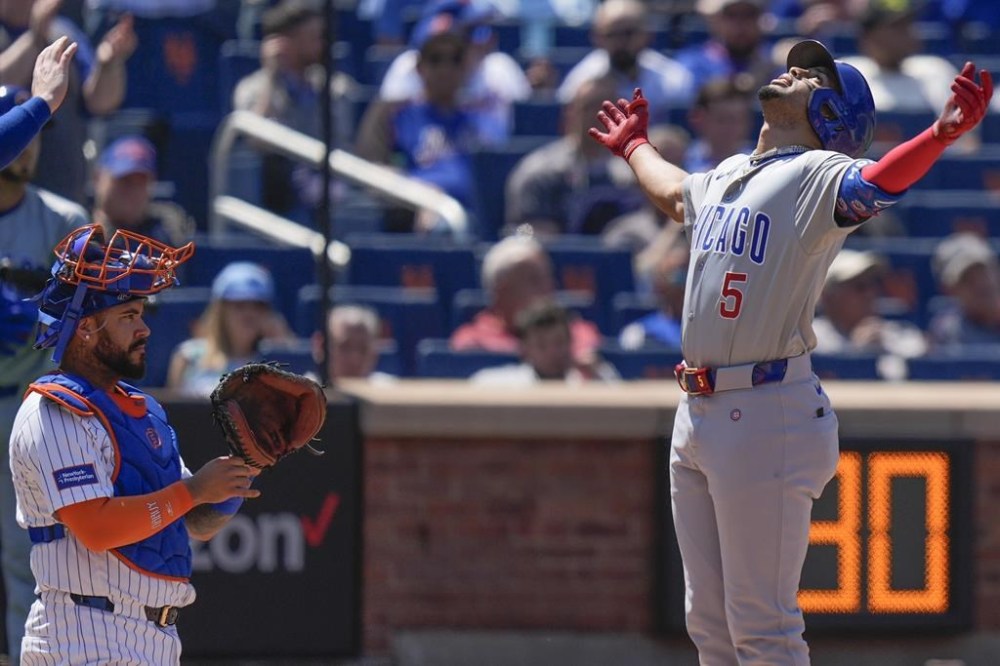Average game time drops 1 minute to 2:36 in second season of MLB pitch clock
Advertisement
Read this article for free:
or
Already have an account? Log in here »
To continue reading, please subscribe:
Monthly Digital Subscription
$0 for the first 4 weeks*
- Enjoy unlimited reading on winnipegfreepress.com
- Read the E-Edition, our digital replica newspaper
- Access News Break, our award-winning app
- Play interactive puzzles
*No charge for 4 weeks then price increases to the regular rate of $19.00 plus GST every four weeks. Offer available to new and qualified returning subscribers only. Cancel any time.
Monthly Digital Subscription
$4.75/week*
- Enjoy unlimited reading on winnipegfreepress.com
- Read the E-Edition, our digital replica newspaper
- Access News Break, our award-winning app
- Play interactive puzzles
*Billed as $19 plus GST every four weeks. Cancel any time.
To continue reading, please subscribe:
Add Free Press access to your Brandon Sun subscription for only an additional
$1 for the first 4 weeks*
*Your next subscription payment will increase by $1.00 and you will be charged $16.99 plus GST for four weeks. After four weeks, your payment will increase to $23.99 plus GST every four weeks.
Read unlimited articles for free today:
or
Already have an account? Log in here »
Hey there, time traveller!
This article was published 02/05/2024 (596 days ago), so information in it may no longer be current.
NEW YORK (AP) — The average time of a nine-inning game is 2 hours, 36 minutes through the first full month of the major league season, down 1 minute from 2023 in the second year of the pitch clock.
Over objections from the players’ association, MLB lowered the timer to 18 seconds from 20 with runners on base while keeping it at 15 seconds with no runners.
Last year, the average increased gradually through the season, from 2:37 through April to 2:38 in May, 2:39 in June, 2:41 in July and August to 2:44 in September.

The season average of 2:40 was down 24 minutes from 2022 and the lowest since 1985.
Union head Tony Clark claims the pitch clock may have contributed to pitcher injuries, calling the timer “an unprecedented threat to our game and its most valuable asset — the players.”
MLB has disputed that, saying Clark “ignores the empirical evidence and much more significant long-term trend, over multiple decades, of velocity and spin increases that are highly correlated with arm injuries.”
Games on April 22 averaged 2:22, the fastest on any day with at least two nine-inning games since 1986 and down 7 minutes from the fastest day last year.
Time needed for pitching changes has dropped 10 seconds to 2:36 following a change this year lowering the clock to 2 minutes from 2:15 after the pitcher crosses the warning track.
Clock violations dropped to 0.32 per game from 0.70 through the same number of games last year, and games with no violations increased to 74% from 52%. The violation average declined from 0.38 in the season’s first week to 0.35 in the second, 0.33 in the third, 0.31 in the fourth, 0.27 in the fifth and 0.26 in the sixth.
Colorado, Kansas City, Oakland and Toronto have just one violation each.
The major league batting average of .239 is down from .249 through the first month last season following the implementation of limits on defensive shifts. The average finished at .248 last year.
___
AP MLB: https://apnews.com/hub/MLB



